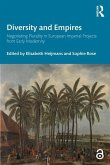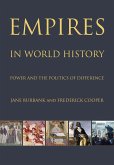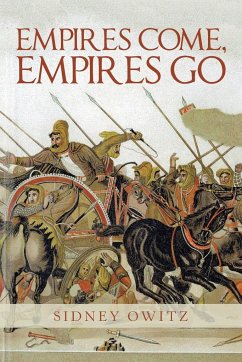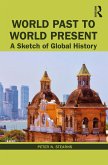Diversity and Empires
Negotiating Plurality in European Imperial Projects from Early Modernity
Herausgeber: Rose, Sophie; Heijmans, Elisabeth
Diversity and Empires
Negotiating Plurality in European Imperial Projects from Early Modernity
Herausgeber: Rose, Sophie; Heijmans, Elisabeth
- Gebundenes Buch
- Merkliste
- Auf die Merkliste
- Bewerten Bewerten
- Teilen
- Produkt teilen
- Produkterinnerung
- Produkterinnerung
Examining diversity as a fundamental reality of empire, this book explores European colonial empires, both terrestrial and maritime, to show how they addressed the questions of how to manage diversity.
Andere Kunden interessierten sich auch für
![Diversity and Empires Diversity and Empires]() Diversity and Empires34,99 €
Diversity and Empires34,99 €![Empires in World History Empires in World History]() Jane BurbankEmpires in World History35,99 €
Jane BurbankEmpires in World History35,99 €![World History World History]() Philip ParkerWorld History22,99 €
Philip ParkerWorld History22,99 €![Empires Come, Empires Go Empires Come, Empires Go]() Sidney OwitzEmpires Come, Empires Go18,99 €
Sidney OwitzEmpires Come, Empires Go18,99 €![The Scent of Empires The Scent of Empires]() Karl Schlogel (Frankfurt European University Viadrina)The Scent of Empires16,99 €
Karl Schlogel (Frankfurt European University Viadrina)The Scent of Empires16,99 €![Empires of Remorse Empires of Remorse]() Tom Bentley (UK. University of Aberdeen)Empires of Remorse215,99 €
Tom Bentley (UK. University of Aberdeen)Empires of Remorse215,99 €![World Past to World Present World Past to World Present]() Peter N. Stearns (George Mason University)World Past to World Present60,99 €
Peter N. Stearns (George Mason University)World Past to World Present60,99 €-
-
-
Examining diversity as a fundamental reality of empire, this book explores European colonial empires, both terrestrial and maritime, to show how they addressed the questions of how to manage diversity.
Hinweis: Dieser Artikel kann nur an eine deutsche Lieferadresse ausgeliefert werden.
Hinweis: Dieser Artikel kann nur an eine deutsche Lieferadresse ausgeliefert werden.
Produktdetails
- Produktdetails
- Verlag: Taylor & Francis Ltd
- Seitenzahl: 256
- Erscheinungstermin: 2. Juni 2023
- Englisch
- Abmessung: 240mm x 161mm x 18mm
- Gewicht: 524g
- ISBN-13: 9781032325842
- ISBN-10: 1032325844
- Artikelnr.: 67513884
- Herstellerkennzeichnung
- Libri GmbH
- Europaallee 1
- 36244 Bad Hersfeld
- gpsr@libri.de
- Verlag: Taylor & Francis Ltd
- Seitenzahl: 256
- Erscheinungstermin: 2. Juni 2023
- Englisch
- Abmessung: 240mm x 161mm x 18mm
- Gewicht: 524g
- ISBN-13: 9781032325842
- ISBN-10: 1032325844
- Artikelnr.: 67513884
- Herstellerkennzeichnung
- Libri GmbH
- Europaallee 1
- 36244 Bad Hersfeld
- gpsr@libri.de
Elisabeth Heijmans (University of Antwerp) is an economic and social historian of French and Dutch early modern colonialism and colonial trade. She is the author of the 2020 monograph The Agency of Empire : Connections and Strategies in French Overseas Expansion (1686-1746) and has published in English, French, and Dutch. Sophie Rose is a postdoctoral researcher at the University of Duisburg-Essen with an interest in the colonial Dutch Caribbean, global history, and the history of morality. She is currently adapting her PhD dissertation, Regulating Relations: Controlling Sex and Marriage in the Early Modern Dutch Empire, into a book.
Part 1: Religion and the negotiation of belonging
Chapter 1. Old and New Members: Religious and Civic Conversion in the
Iberian Worlds
Tamar Herzog, Harvard University
Chapter 2. In and beyond the Portuguese Empire: Coping with marriage ritual
diversity in early modern Goa
Ângela Barreto Xavier, University of Lisbon
Chapter 3. Barrido: A thief, Christian and Pulaya. The implications of
categorization on the eighteenth century Malabar coast
Alexander Geelen, International Institute of Social History
Part 2: Slavery and legal status
Chapter 4. The uses and management of Indigenous, African and mixed-raced
identities in the legal sphere in Portuguese Amazonia (18th century)
André Luís Ferreira, Federal University of Pará
Chapter 5. Experiences of enslaved persons with criminal justice and social
control on Curaçao, 1730-1740
Stef Vink, Leiden University
Chapter 6. Indigenous populations and labor in the Dutch colonial empire -
the example of the Cape and the Guianas
Rafaël Thiebaut, Musée du quai Branly - Jacques Chirac
Part 3: Subjecthood and imperial states
Chapter 7. Making Peace Beyond the Line: Capitulations, Interpolity Law,
and Political Pluralism in Suriname and New Netherland, 1664-1675
Timo McGregor, London School of Economics
Chapter 8. Imperfect Strangers: Frenchmen, foreigners and illegality in
18th-century Guadeloupe
Tessa de Boer, Leiden University
Part 4: Diversity in theory and practice: a longue durée perspective
Chapter 9. Colonial Segregation, Apartheid State and Rainbow Nation:
Negotiating Diversity in Twentieth-Century South Africa
Margret Frenz, University of Stuttgart
Chapter 10. Diversity as a fact of imperial life: Diversity as a fact of
imperial life: a long-term view on Russia
Jane Burbank, New York University
Chapter 1. Old and New Members: Religious and Civic Conversion in the
Iberian Worlds
Tamar Herzog, Harvard University
Chapter 2. In and beyond the Portuguese Empire: Coping with marriage ritual
diversity in early modern Goa
Ângela Barreto Xavier, University of Lisbon
Chapter 3. Barrido: A thief, Christian and Pulaya. The implications of
categorization on the eighteenth century Malabar coast
Alexander Geelen, International Institute of Social History
Part 2: Slavery and legal status
Chapter 4. The uses and management of Indigenous, African and mixed-raced
identities in the legal sphere in Portuguese Amazonia (18th century)
André Luís Ferreira, Federal University of Pará
Chapter 5. Experiences of enslaved persons with criminal justice and social
control on Curaçao, 1730-1740
Stef Vink, Leiden University
Chapter 6. Indigenous populations and labor in the Dutch colonial empire -
the example of the Cape and the Guianas
Rafaël Thiebaut, Musée du quai Branly - Jacques Chirac
Part 3: Subjecthood and imperial states
Chapter 7. Making Peace Beyond the Line: Capitulations, Interpolity Law,
and Political Pluralism in Suriname and New Netherland, 1664-1675
Timo McGregor, London School of Economics
Chapter 8. Imperfect Strangers: Frenchmen, foreigners and illegality in
18th-century Guadeloupe
Tessa de Boer, Leiden University
Part 4: Diversity in theory and practice: a longue durée perspective
Chapter 9. Colonial Segregation, Apartheid State and Rainbow Nation:
Negotiating Diversity in Twentieth-Century South Africa
Margret Frenz, University of Stuttgart
Chapter 10. Diversity as a fact of imperial life: Diversity as a fact of
imperial life: a long-term view on Russia
Jane Burbank, New York University
Part 1: Religion and the negotiation of belonging
Chapter 1. Old and New Members: Religious and Civic Conversion in the
Iberian Worlds
Tamar Herzog, Harvard University
Chapter 2. In and beyond the Portuguese Empire: Coping with marriage ritual
diversity in early modern Goa
Ângela Barreto Xavier, University of Lisbon
Chapter 3. Barrido: A thief, Christian and Pulaya. The implications of
categorization on the eighteenth century Malabar coast
Alexander Geelen, International Institute of Social History
Part 2: Slavery and legal status
Chapter 4. The uses and management of Indigenous, African and mixed-raced
identities in the legal sphere in Portuguese Amazonia (18th century)
André Luís Ferreira, Federal University of Pará
Chapter 5. Experiences of enslaved persons with criminal justice and social
control on Curaçao, 1730-1740
Stef Vink, Leiden University
Chapter 6. Indigenous populations and labor in the Dutch colonial empire -
the example of the Cape and the Guianas
Rafaël Thiebaut, Musée du quai Branly - Jacques Chirac
Part 3: Subjecthood and imperial states
Chapter 7. Making Peace Beyond the Line: Capitulations, Interpolity Law,
and Political Pluralism in Suriname and New Netherland, 1664-1675
Timo McGregor, London School of Economics
Chapter 8. Imperfect Strangers: Frenchmen, foreigners and illegality in
18th-century Guadeloupe
Tessa de Boer, Leiden University
Part 4: Diversity in theory and practice: a longue durée perspective
Chapter 9. Colonial Segregation, Apartheid State and Rainbow Nation:
Negotiating Diversity in Twentieth-Century South Africa
Margret Frenz, University of Stuttgart
Chapter 10. Diversity as a fact of imperial life: Diversity as a fact of
imperial life: a long-term view on Russia
Jane Burbank, New York University
Chapter 1. Old and New Members: Religious and Civic Conversion in the
Iberian Worlds
Tamar Herzog, Harvard University
Chapter 2. In and beyond the Portuguese Empire: Coping with marriage ritual
diversity in early modern Goa
Ângela Barreto Xavier, University of Lisbon
Chapter 3. Barrido: A thief, Christian and Pulaya. The implications of
categorization on the eighteenth century Malabar coast
Alexander Geelen, International Institute of Social History
Part 2: Slavery and legal status
Chapter 4. The uses and management of Indigenous, African and mixed-raced
identities in the legal sphere in Portuguese Amazonia (18th century)
André Luís Ferreira, Federal University of Pará
Chapter 5. Experiences of enslaved persons with criminal justice and social
control on Curaçao, 1730-1740
Stef Vink, Leiden University
Chapter 6. Indigenous populations and labor in the Dutch colonial empire -
the example of the Cape and the Guianas
Rafaël Thiebaut, Musée du quai Branly - Jacques Chirac
Part 3: Subjecthood and imperial states
Chapter 7. Making Peace Beyond the Line: Capitulations, Interpolity Law,
and Political Pluralism in Suriname and New Netherland, 1664-1675
Timo McGregor, London School of Economics
Chapter 8. Imperfect Strangers: Frenchmen, foreigners and illegality in
18th-century Guadeloupe
Tessa de Boer, Leiden University
Part 4: Diversity in theory and practice: a longue durée perspective
Chapter 9. Colonial Segregation, Apartheid State and Rainbow Nation:
Negotiating Diversity in Twentieth-Century South Africa
Margret Frenz, University of Stuttgart
Chapter 10. Diversity as a fact of imperial life: Diversity as a fact of
imperial life: a long-term view on Russia
Jane Burbank, New York University








